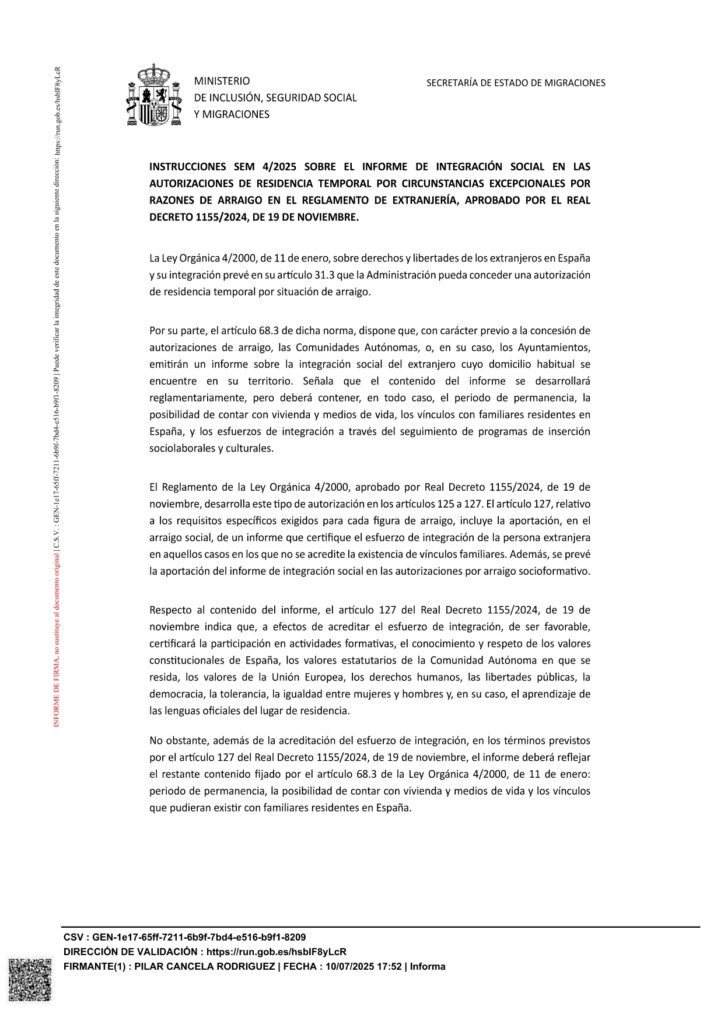The Social Integration Report in Rooting Authorizations After the Immigration Regulation Reform
The recent entry into force of Royal Decree 1155/2024, which substantially amends the Spanish Immigration Regulation, has introduced significant changes to the requirements for obtaining temporary residence permits under exceptional circumstances for reasons of social roots (arraigo)—particularly concerning the Social Integration Report. This document, which is key to proving the effective integration of the foreign national into Spanish society, has been subject to more detailed regulation under the SEM Instructions 4/2025, issued by the Spanish Secretary of State for Migration.

Nature and Function of the Social Integration Report
The Social Integration Report certifies a foreign national’s level of connection with Spanish society. In cases of social arraigo, it is required when the applicant cannot demonstrate family ties with Spanish citizens or legal residents (such as a spouse, registered partner, or first-degree relatives in a direct line). It is also mandatory in socio-formative arraigo applications.
According to Article 127 of the new Regulation and Article 68.3 of Organic Law 4/2000, the report must address aspects such as continuous residence in Spain, availability of housing and means of support, family ties, and efforts toward integration—this includes participation in training or social-labor programs, and adherence to constitutional, regional, and European values.
Who Issues the Report and What Is Its Validity?
The report is issued by the Autonomous Communities or, alternatively, by City Councils, depending on the applicant’s place of residence. This residence must match the current registration (empadronamiento) at the time the report is requested. Once requested, the competent authority has a maximum of one month to issue the report.
The report is valid for six months from the date of issue. However, if not submitted together with the residence application, the file will not be automatically rejected. Instead, the applicant will be asked to submit the report or substitute documentation within 15 days.
Mandatory Minimum Content of the Report
The report must include, at a minimum, the following information:
-
Full identification of the applicant (name, passport, and NIE if applicable).
-
Date of issue (must be within the six months prior to the residence application).
-
Issuing body (Autonomous Community or City Council).
-
Evidence of continuous residence in Spain for at least two years prior to the application.
Additionally, it may contain an evaluation of the applicant’s integration, including:
-
Participation in training or educational programs.
-
Respect for and knowledge of democratic and constitutional values.
-
Participation in socio-labor and cultural integration initiatives.
-
Knowledge of the official languages of the place of residence.
-
Availability of housing and financial means.
-
Family ties with residents in Spain.
Substitute Documentation When the Report Is Not Issued in Time
If the administration does not issue the report within the one-month period, the applicant may justify their integration using alternative documentation, such as:
-
Registration records (volantes de empadronamiento), medical or educational documents, bank statements, rental or utility contracts.
-
Certificates of participation in training programs.
-
Bank certifications or proof of public assistance.
-
Documents evidencing family relationships.
This documentation may only be submitted after the one-month period has passed from the report request, and the Immigration Office will only consider the official report if it is favorable and submitted by the applicant.
Transitional Regime: Validity of Reports Issued Before the Reform
The new regulation provides a transitional provision for applications submitted after May 20, 2025 (the reform’s effective date). Reports issued under the previous Royal Decree 557/2011 will be accepted if:
-
They were issued before May 20, 2025, or
-
They were requested before that date and issued afterward.
Likewise, for applications submitted before May 20, 2025, applicants who request the new regulation to be applied may also use reports issued under the previous regime.
Importance of the New Model and Its Practical Application
The standardization of the format and content of the Social Integration Report is a major milestone in the arraigo application process. The proposed model ensures more equitable treatment across Autonomous Communities and municipalities and significantly reduces administrative discretion, promoting consistent and well-founded decisions.
Moreover, the instruction states that if social services fail to issue the report within 30 days, the applicant may replace it with any legally admissible proof demonstrating their degree of social integration. This includes, for example, work contracts, academic certificates, reports from NGOs or third-sector organizations, and other documents evidencing the applicant’s integration into Spanish society.
The adoption of this standardized report model represents a significant step toward more orderly and human-centered immigration management. It reinforces the role of social services as key actors in the process and opens the door to a more comprehensive and realistic assessment of each individual’s case.
Conclusion: Standardized Treatment and Less Discretion
These new instructions consolidate the Social Integration Report as a fundamental tool for accessing both social and socio-formative arraigo residence permits. More importantly, they broaden the scope of what it means to be integrated into Spanish society: beyond the mere duration of stay, greater weight is now given to active participation in the country’s educational, cultural, and economic life.
It is also crucial to highlight the importance of this standardization, since until now, these reports were drafted freely by the responsible authorities, often leading to excessively restrictive interpretations of the foreigner’s background.
The recognition of private documents as valid proof of duration of stay—both for issuing the report and replacing it in case of delay—opens two key avenues: first, it allows individuals who have spent more than two years in Spain without being formally registered to still access the report and obtain the arraigo permit; second, it provides a safety valve for overloaded or slow municipal services and social institutions.
At Guilherme Cesar Immigration Lawyer, we closely monitor every legal development to offer you clear, up-to-date, and strategic advice. If you’re considering applying for a residence permit based on arraigo, contact us—we’ll guide you step by step to ensure your application complies fully with current legal standards.

